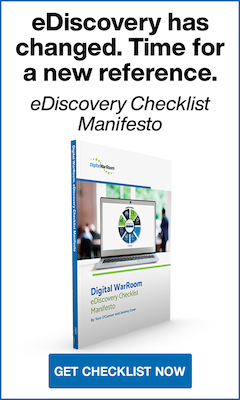In the legal profession, eDiscovery has become one of the most expensive and time-consuming aspects of litigation. Nationally, the American Bar Association (ABA) estimates that document review alone accounts for more than 80 percent of total litigation spending.
That translates to more than $42.1 billion a year! And as data sets and volumes increase, that number is only going to go up.
So what's driving these high eDiscovery costs? And more importantly, is there anything that can be done about it? Let's explore and compare pricing for solutions that can help law firms manage their electronically stored information and relevant data more efficiently and reduce overall discovery costs.
eDiscovery costs and cost reduction for law firms completing document review
Traditional discovery was often an expensive and cumbersome task, but with electronically stored information (ESI) the amount of data included in discovery has exponentially grown. And with an increase in data to review comes an increase in cost.
In fact, the cost of eDiscovery has been rising at an alarming rate. A study by the Rand Corporation found that the median cost of discovery in federal civil cases rose from $100,000 in 2003 to $600,000 in 2006, and it is estimated that this figure will continue to rise.
What's driving high electronic discovery costs?
One of the main drivers of these high costs is the time-consuming eDiscovery process of reviewing and culling large data sets. This can often be a manual process, which requires a team of lawyers and paralegals to review documents one by one.
In addition, traditional discovery methods are often not equipped to handle the volume or variety of data that is now being produced in litigation. As a result, law firms are forced to rely on expensive outside vendors to assist with the review and processing of data.
The good news: We now have a solution for electronically stored information
Fortunately, there is now a solution that can help law firms reduce the cost of eDiscovery. This solution is called technology-assisted review (TAR). TAR is a method of using predictive coding and other artificial intelligence techniques to automatically review and categorize documents.
This can dramatically reduce the amount of time and money that is spent on document review. In addition to technology-assisted review, there are other solutions that can help law firms manage their ESI.
One such solution is an eDiscovery platform that provides a centralized repository for all of a firm's ESI. This platform can be used to manage the entire discovery process, from data collection to document review to production.
Another solution is an eDiscovery managed services provider (MSP). MSPs offer a variety of services, including document review, data processing, and hosting.
Understanding two basic pricing models
When it comes to eDiscovery, there are two basic pricing models: the all-inclusive model and the la carte model. The all-inclusive model is where a firm pays one flat fee for all of the eDiscovery services they need. The la carte model is where a firm pays for each service separately.
So, which pricing model is right for your firm? Generally speaking, it depends on several factors, including the size and complexity of your cases, the volume of data you need to review, and your budget. If you're not sure which pricing model is right for you, we recommend that you speak to an eDiscovery expert.
Hidden costs of eDiscovery
Picking the wrong eDiscovery solution can hurt your budget and your case! Hidden costs can include billable hours to correct errors from third-party vendors, delays that impact your case, security breaches, and more.
eDiscovery Pricing Comparisons
Now that we've reviewed some of the basics of eDiscovery pricing, let's take a look at how the cost of eDiscovery compares between different vendors. We'll review what each company has to offer in terms of both costs and technology services to aid in discovery.
Both the actual and hidden costs of eDiscovery are what can make it the most expensive part of modern litigation. However, they also make it a great place to cut costs. Understanding the real numbers can help you and your practice set and stick to the budget so you devote less time to document review and more time to winning clients' cases. So read on and compare!
Digital WarRoom vs Logikcull
Digital WarRoom offers three different pricing tiers:
- pro-software: on-prem
- single matter: hosted
- private cloud: hosted
Logikcull offers only cloud-based solutions. It's a great solution for day-to-day discovery and low-cost projects, but may not be as robust as what your law firm needs on an ongoing basis.
Additionally, they break their software into two areas: eDiscovery and legal holds. Meanwhile, DWR software offers more inclusive products, including early case assessment (ECA) and gross relevancy analysis. Logikcull only posts their pricing for their free trial and pay-as-you-go monthly service. They do not publish their subscription costs.
Digital WarRoom vs Everlaw
Everlaw is a popular tool for its ease of use and TAR. However, the higher costs from this vendor make it feasible only for firms handling large cases and big budgets. Some attorneys found that once they shared the cost of Everlaw review with clients, they opted not to use the software for their electronic data.
And what good is eDiscovery software if your clients can't afford for you to use it in litigation? These tools are meant to help reduce costs. This is why DWR has no processing fees and no data hosting costs.
Digital WarRoom vs Relativity
Relativity is a useful tool for data-heavy, low-velocity matters, with a million documents (electronic data) or more. They do not offer a cloud-based solution, nor do they publish their costs online. However, subscriptions can easily cost six figures, and additional costs and fees are likely involved.
Digital WarRoom vs Ipro
Ipro is another vendor that only offers on-premise software. Alternatively, DWR offers both on-premise and cloud-based, to meet the individual needs of the attorneys using these tools.
Ipro is commonly used for its suite of products designed for specific facets of discovery and investigations, from data processing to review. However, it is unranked in terms of popularity and offers limited training and support. DWR offers ongoing support and training as document review attorneys or other legal professionals are added to your team.
Digital WarRoom vs Onna
Onna is a highly ranked tool known for its ease of use. However, it's only ideal for teams looking for preservation and collection of electronic data alone. It lacks other essential steps of the review process including tagging, redaction, and intuitive searches.
Its use limitations coupled with limited support options make Onna a very basic, niche software. So while it may seem cost-effective initially, when you consider the limited scope of services, many attorneys pass on this option.
Digital War Room vs Exterro
Exterro is a more comprehensive platform than Onna, best used to manage data governance and reservation. Although this may seem straightforward, Exterro's platform is broken into complex modules, each of which requires specific training.
Thus, costs associated with reviewer training are higher for this product that doesn't even cover the whole scope of the eDiscovery process. Plus, some of the more specialized trainings and certifications are offered - but only at an additional price. DWR offers an Unlimited Email Support Desk with all packages.
Digital WarRoom vs Concordance
Concordance is one of the lowest-ranked options in the field of electronic discovery tools. It can be hard to navigate and does not offer cloud-based services.
Additionally, Concordance's pricing includes add-on fees for services like support, IT security, and software updates. Even their startup training is costly and requires significant in-house resources.
Digital WarRoom vs Lexbe
Lexbe is a reasonable option for boutique firms with teams of review attorneys dedicated to the review phase. However, scalability is limited and a la carte pricing can add up. Additionally, users have reported frequent bugs while working through discovery requests.
In an increasingly digital world, can you assume that the vast majority of your cases will be serviceable with such limited options? Unfortunately, Lexbe doesn’t even offer integrations with ESI data sources. Alternatively, DWR offers tiered pricing that increases cost efficiency as matters grow.
Digital WarRoom vs Nextpoint
Nextpoint offers solutions for cost-conscious and small attorney review teams. While they offer some project management, it is not nearly as robust as Digital WarRoom's management console. And while overall costs are lower than many other options on the market, scalability is limited and becomes more expensive as team members are added.
Digital WarRoom vs Zapproved
Zapproved is primarily used to handle the far left of the EDRM - i.e. the earliest stages and those before eDiscovery processing. Their system is best suited to manage the first steps of the lifecycle of a matter, allowing you to create a defensible legal hold and preservation process.
Like DWR, Zapproved offers better support than many competitors. However, their product is limited to the extent that users may feel frustrated once it's time to review data.
Digital WarRoom vs eDiscovery Point
eDisocvery Point is part of the old guard - an expansive but expensive option. Although with this vendor you will only pay for reviewed documents, eDiscovery Point can get really expensive as your caseload grows since they charge hosting fees starting at $8/Gb and $130 per Gb processed.
Additionally, their training and support are complicated, making startup an investment of time and money that you may not have.
Why DWR Offers the Best Value for eDiscovery Cost
Finding the right eDiscovery solution for your firm can seem like finding the needle in the haystack. But it doesn't have to be that complicated! Digital WarRoom offers cost-effective and comprehensive tools for every stage of the document review phase.
Let's break down those three pricing options for Digital WarRoom:
Pro Software: On-Premise
- Unlimited Matters
- Single User License
- No Data Hosting Costs
- No Processing Fees
- Unlimited Email Support Desk
- 1 Hour of Installation Support
- 2 Hours of Training
- $1,795/YEAR/LICENSE
Single Matter: Hosted
- 1 Matter Unlimited Users
- 25 GBs Included
- $10/GB thereafter
- No Processing Fees
- Unlimited Email Support Desk
- Unlimited Training
- Month to Month Tiered Pricing
- $250/MONTH
Private Cloud: Hosted
- Unlimited Matters and Users
- 500 GBs Included
- $1/GB thereafter
- No Processing Fees
- Management Console
- Unlimited Email Support Desk
- Unlimited Training
- $2,000/MONTH
Takeaways on eDiscovery Costs and Why Digital WarRoom is a Great Solution
As you can see, many factors contribute to the high cost of eDiscovery. But with the right solutions in place, it is possible to reduce the cost of eDiscovery and manage your electronic data more efficiently.
Digital WarRoom has streamlined vital steps such as automatic document processing, advanced filtering and keyword searching, document marking, privilege log, redactions, production, and more. We address the full EDRM so you don't have to worry that you've missed a step as you move through electronic discovery.
If you would like to learn more about how Digital WarRoom can help your law firm save time and money on your eDiscovery projects, contact us today for a free consultation.
-1.png?width=400&height=164&name=DWRLogoClassic%20-%20Copy%20(2)-1.png)









Comment On This Article